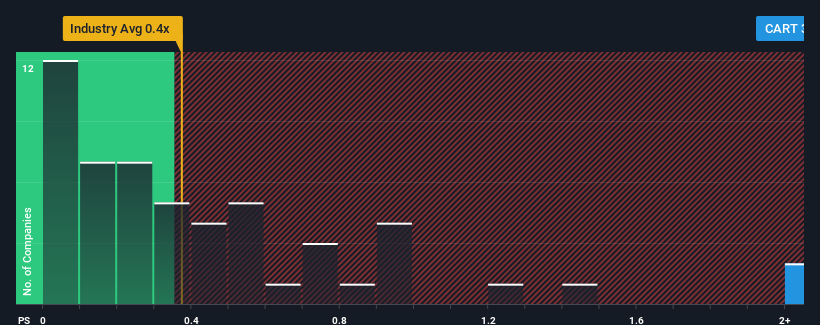- United States
- /
- Food and Staples Retail
- /
- NasdaqGS:CART
Why Investors Shouldn't Be Surprised By Maplebear Inc.'s (NASDAQ:CART) 34% Share Price Surge
Despite an already strong run, Maplebear Inc. (NASDAQ:CART) shares have been powering on, with a gain of 34% in the last thirty days. Longer-term shareholders would be thankful for the recovery in the share price since it's now virtually flat for the year after the recent bounce.
Following the firm bounce in price, when almost half of the companies in the United States' Consumer Retailing industry have price-to-sales ratios (or "P/S") below 0.4x, you may consider Maplebear as a stock not worth researching with its 3.1x P/S ratio. However, the P/S might be quite high for a reason and it requires further investigation to determine if it's justified.
See our latest analysis for Maplebear

What Does Maplebear's P/S Mean For Shareholders?
Recent times have been advantageous for Maplebear as its revenues have been rising faster than most other companies. It seems the market expects this form will continue into the future, hence the elevated P/S ratio. If not, then existing shareholders might be a little nervous about the viability of the share price.
Keen to find out how analysts think Maplebear's future stacks up against the industry? In that case, our free report is a great place to start.What Are Revenue Growth Metrics Telling Us About The High P/S?
In order to justify its P/S ratio, Maplebear would need to produce outstanding growth that's well in excess of the industry.
Retrospectively, the last year delivered an exceptional 19% gain to the company's top line. The latest three year period has also seen an excellent 106% overall rise in revenue, aided by its short-term performance. Therefore, it's fair to say the revenue growth recently has been superb for the company.
Shifting to the future, estimates from the analysts covering the company suggest revenue should grow by 8.4% per annum over the next three years. With the industry only predicted to deliver 4.7% per annum, the company is positioned for a stronger revenue result.
In light of this, it's understandable that Maplebear's P/S sits above the majority of other companies. Apparently shareholders aren't keen to offload something that is potentially eyeing a more prosperous future.
What Does Maplebear's P/S Mean For Investors?
Maplebear's P/S has grown nicely over the last month thanks to a handy boost in the share price. We'd say the price-to-sales ratio's power isn't primarily as a valuation instrument but rather to gauge current investor sentiment and future expectations.
Our look into Maplebear shows that its P/S ratio remains high on the merit of its strong future revenues. At this stage investors feel the potential for a deterioration in revenues is quite remote, justifying the elevated P/S ratio. Unless these conditions change, they will continue to provide strong support to the share price.
A lot of potential risks can sit within a company's balance sheet. Take a look at our free balance sheet analysis for Maplebear with six simple checks on some of these key factors.
If you're unsure about the strength of Maplebear's business, why not explore our interactive list of stocks with solid business fundamentals for some other companies you may have missed.
New: Manage All Your Stock Portfolios in One Place
We've created the ultimate portfolio companion for stock investors, and it's free.
• Connect an unlimited number of Portfolios and see your total in one currency
• Be alerted to new Warning Signs or Risks via email or mobile
• Track the Fair Value of your stocks
Have feedback on this article? Concerned about the content? Get in touch with us directly. Alternatively, email editorial-team (at) simplywallst.com.
This article by Simply Wall St is general in nature. We provide commentary based on historical data and analyst forecasts only using an unbiased methodology and our articles are not intended to be financial advice. It does not constitute a recommendation to buy or sell any stock, and does not take account of your objectives, or your financial situation. We aim to bring you long-term focused analysis driven by fundamental data. Note that our analysis may not factor in the latest price-sensitive company announcements or qualitative material. Simply Wall St has no position in any stocks mentioned.
About NasdaqGS:CART
Maplebear
Maplebear Inc., doing business as Instacart, engages in the provision of online grocery shopping services to households in North America.
Flawless balance sheet and fair value.
Similar Companies
Market Insights
Community Narratives





